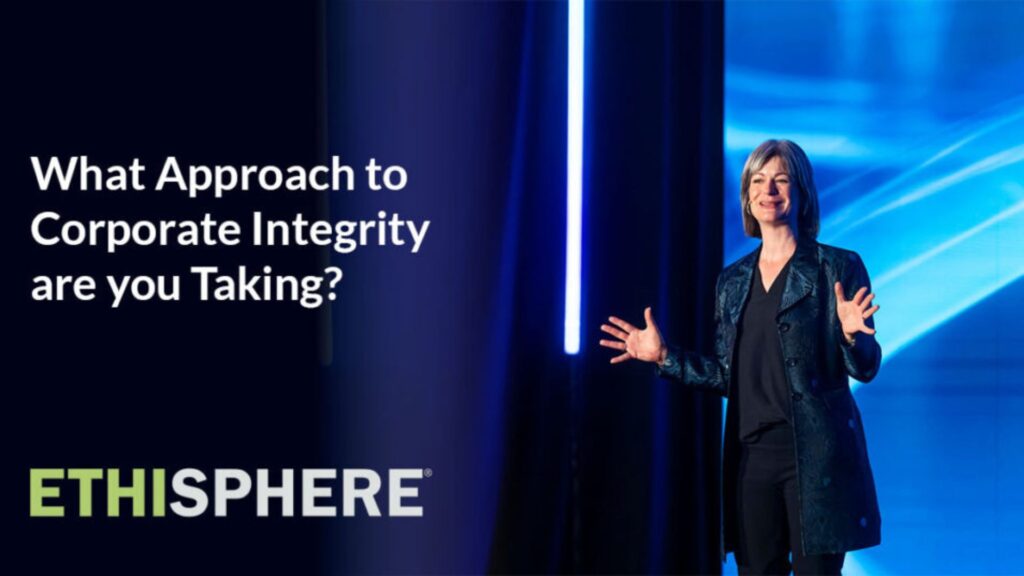“Ethics may start at the top,” says Erica Salmon Byrne, Chief Strategy Officer and Executive Chair, Ethisphere and the Business Ethics Leadership Alliance, “but managers steer the moral compass of the company. Training people leaders to appropriately act on conveyed misconduct is essential to encouraging a speak-up culture.”
Erica’s comments are a compelling call-out in the EY Global Integrity Report 2024, which presents the findings from EY’s survey of nearly 5,500 board members, senior managers, managers, and employees in a sample of large organizations and public bodies in more than 50 countries and territories around the world. The report notes four key trends that ethics and compliance professionals should note:
- 38% of respondents say they would behave unethically to advance their own career
- 25% of workers, 51% of senior managers, and 67% of board members say they would behave unethically for their own benefit
- 65% of board members and 57% of senior management feel pressured to not report misconduct
- 54% of global respondents say employees do not understand their own compliance policies
A major aspect of addressing these trends is understanding how or approach integrity as an organization. According to the report, 22% of organizations take an integrity-first approach, in which management really speaks out about the importance of integrity and the policies and programs enacted to turn those words into meaningful action. Another 23% of organizations take a policy-driven approach, relying mainly on a procedural, rather than a cultural, mindset to advance organizational integrity. Nearly half (49% )of organizations suffer from a “say-do” gap, wherein how executives speak about integrity doesn’t fully align with how the organization acts to operationalize integrity.
Notably, the number of “integrity-first” respondents dropped from 32% to 22% since EY’s last integrity report in 2022. EY explains that this might be because some companies may feel that they have sufficient integrity policies and programs in place and therefore leadership no longer feels the need to personally champion integrity so much. This is a step backward from best practices, however. EY notes that there are four ways an organization should consider to build a people-centered, integrity-focused organization.
Lead from the top.
As mentioned earlier, there is substantial room for improvement when it comes to senior leaders and Board members to demonstrate their personal commitment to ethics and integrity. “The more employees see leaders standing up for them and taking concrete action in response to reports of misconduct, without retaliation, the more likely they are to report wrongdoing when they observe it,” the report says.
Ethisphere Insight: EY makes an excellent point about the power of speak-up culture to support cultures of integrity. According to Ethisphere data, 93% of employees are willing to report misconduct, but only 50% actually do when the moment of truth arrives. Download a copy of Ethisphere’s 2024 Ethical Culture Report here to learn how you can close your organization’s speak-up gap.
Design and implement a structure to execute strategy.
Establish sound governance by aligning roles and responsibilities, establishing clear accountability, breaking down silos to allow the free flow of information, and building trust through transparency.
Ethisphere Insight: Not every organization has a Chief Compliance Officer, or even a standalone compliance function. To learn more about how to make the case for a Chief Compliance Officer, check out this special episode of the Ethicast here.
Strengthen a culture of integrity across the organization.
Integrity is a team effort, and compliance is not a stand-alone function. Embed ethics and compliance standards into daily operations and procedures, work with leadership to establish compliance KIPs across the organization, and establish compensation structures that reward ethical behavior.
Boost awareness, training, and communication.
These three items are at the top of leadership agendas to address integrity risk, but in the meantime, leaders need to communicate clearly (and frequently) exactly why integrity matters to the organization. When employees understand how integrity imparts a business advantage, compliance comes naturally.
To read the full EY Global Integrity Report 2024, click here. And for a wealth of helpful resources to advance your own organization’s culture of business integrity, sign up for Ethisphere’s Resource Center All-Access Pass here.
 4 Minutes - Read Now
4 Minutes - Read Now 






